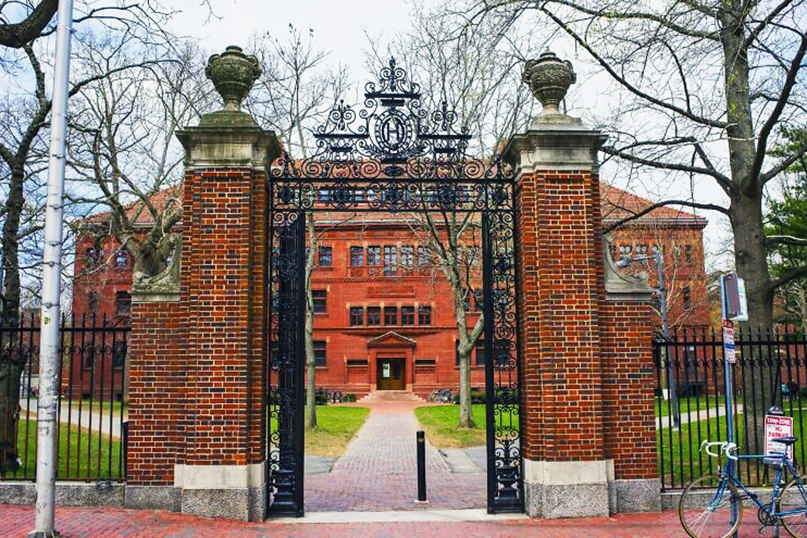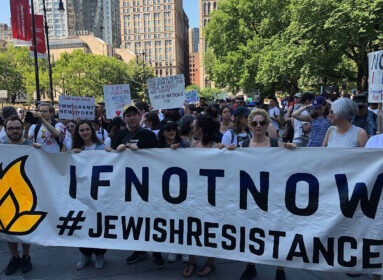
By Jonathan S. Tobin
(JNS) The late conservative author and journalist William F. Buckley famously said that, “I’d rather entrust the government of the United States to the first 400 people listed in the Boston telephone directory than to the faculty of Harvard University.” A great many Americans who view the dominance of Ivy League-educated elites with skepticism – no matter whether they call themselves Democrats or Republicans – shared his lack of faith in Harvard, as well as the implicit trust in the good sense of ordinary Americans that this famous jibe (which was, it should be noted, uttered by a proud graduate of Yale) represented.
But the hold that Harvard has on the imagination of Americans who still believe it to be a pillar of educational excellence cannot be denied. It’s the school that the smartest students still aspire to attend and the one whose graduates, along with those of its competitors at the top of the higher-education pyramid, still have the easiest path to the best jobs, the most money and political influence. Events that occur on the venerable campus in Cambridge, Mass., always generate an outsized if not entirely disproportionate amount of coverage and commentary.
That’s the only way to explain why an editorial representing the views of the students who run the school’s Harvard Crimson newspaper about the BDS movement and Israel has become a cause célèbre. That’s especially true among Jewish outlets and audiences – a demographic slice of the country whose interest in education means that it can be counted on to regard anything concerning the school that claims to be the country’s best to be of great importance.
The piece represents the sort of feeble reasoning, poor command of history and the facts – and less than exemplary command of the English language that ought to, among other things – lend credence to Buckley’s quip. It has generated an avalanche of responses from pro-Israel authors, including one eloquent and clearly courageous article from a Crimson editor who was a lone dissenter from the rest of its staff’s embrace of anti-Zionist canards.
Suffice it to say that the willingness of these elite students to embrace the cause of a “free Palestine” and its implicit support for the cause of erasing the sole Jewish state on the planet is a disgrace. But at this point, one of the most interesting things about the controversy it generated concerns a statement signed by Harvard faculty opposing the paper’s position and defending Zionism.
The petition was circulated by four prestigious scholars: Gabriella Blum and Jesse Fried of Harvard Law School; Steven Pinker, an economist and professor of psychology; and Harvard president emeritus, as well as former U.S. Secretary of the Treasury, Lawrence Summers. It was signed by more than 70 other Harvard faculty members. Among the most famous names on it are two persons who are now retired from teaching at the school: the great Ruth Wisse, an author of note as well as a professor of Yiddish literature; and Alan Dershowitz, an author of many books who was a fixture at the law school for five decades, in addition to his well-known and often controversial legal practice.
Those who put their names to it deserve great credit, but the question is not so much which names are on it but why the overwhelming majority of them are from the physical sciences, especially medicine, and so few, like those who organized the petition, teach law, politics, history and literature.
Among the names most conspicuous by their absence is Noah Feldman, who succeeded Dershowitz as Felix Frankfurter Professor of Law (named for the famous Jewish legal scholar and Supreme Court justice), as well as the director of the Julis-Rabinowitz Program on Jewish and Israeli Law.
Feldman is a well-known author and commentator and has used his prestigious perch at Harvard to criticize anti-BDS laws as violating the First Amendment. That’s a position that misinterprets statutes aimed at prohibiting clearly illegal discriminatory conduct. Yet he has not joined those who oppose the existence of a Jewish state, which is the objective of the BDS movement.
But the failure of the person who is one of the leading lights at Harvard, as well as one that has been given an important Jewish portfolio there to say that he does support Zionism and opposes BDS, says a great deal about how unfashionable support for Israel has become in academia.
While there may be a host of individual reasons why faculty members chose not to sign the petition, it is impossible to avoid coming to some strong conclusions about those who did and those who did not.
The paucity of those from the liberal arts – most especially, those disciplines where intersectionality and critical race theory have taken hold – is obvious. For anyone to sign on to a document opposing a fashionable cause like BDS or to stand with the state of Israel at a time when leftist doctrine holds it to be a function of white privilege guilty of oppression would make them pariahs. That is something only those with tenure and a secure reputation that is already established – not to mention being closer to the end of their careers than its beginning – could dare to do.
It appears that it is only in schools where politics plays only a marginal role or none at all – as, thankfully, appears to be the case for the study of medicine – that a broad cross-section of professors found the guts to criticize the Crimson’s embrace of the delegitimization of Jewish rights.
A great deal has been written about the pressure that is exerted on students that makes it difficult for them to express support for Israel in academic settings because of the actions of left-wing and antisemitic students and faculty, But the same also applies for faculty members. Indeed, faculty members who are not protected by tenure or their professional reputations may be far more vulnerable to the attentions of woke mobs than their students.
While students face the possibility of being ostracized by their peers or punished by professors who don’t accept the legitimacy of opposing views, those who teach can find themselves the object of the sort of attention that leads to people losing their jobs. They can also discover that it’s impossible to go on working within a department where their peers and students are intolerant bigots masquerading as defenders of human rights.
This is a wake-up call for those who send their children and, just as important, their charitable donations to schools like Harvard in the expectation that those whom they are supporting won’t engage in antisemitic agitation or fail to stand up to it.
The Harvard BDS incident is important for a number of reasons, not the least being that it shows how pervasive the normalization of support for antisemitic causes has become at America’s universities and colleges.. That’s something that cannot fail to have repercussions in the future as Harvard’s BDS supporters eventually take their accustomed places as members of the nation’s ruling elite. That’s a sobering thought that should also remind us that placing our country in the hands of people based largely on their educational pedigree is something that doesn’t necessarily protect us against prejudice and anti-Jewish malice.
Jonathan S. Tobin is editor-in-chief of JNS (Jewish News Syndicate).
100+ Harvard faculty, alumni denounce student paper’s BDS endorsement
By Andrew Lapin
(JTA) – The Harvard Crimson’s recent endorsement of the Boycott, Divestment, Sanctions movement (BDS) has attracted far more wide-ranging attention than a typical student paper’s editorial page, as faculty and alumni of the Ivy League institution have lined up to denounce the student paper’s op-ed and condemn the shift in Israel discussion on college campuses.
In an open letter, more than 100 Harvard faculty members objected to the paper endorsing an academic and financial boycott of the state of Israel, including the school’s former president Larry Summers; prominent psychologist and author Steven Pinker; endowed law professor Gabriella Blum; former Harvard Medical School dean Jeffrey Flier; and emeritus law professor and longtime pro-Israel advocate Alan Dershowitz.
“We believe that many well-meaning people with no hate in their hearts, including those at Harvard, gravitate to this movement believing that it offers a means for advancing Palestinian rights and peace in the Middle East,” the letter reads. “But the reality is that BDS merely coarsens the discourse on campus and contributes to antisemitism.”
The letter was organized by the Academic Engagement Network, a pro-Israel campus advocacy group.
Summers, a former U.S. treasury secretary, told the Jewish Telegraphic Agency that he signed the open letter in part “to reassure Jewish students on our campus that they are not in a hostile environment,” and “to reassure the wider world that the student newspaper did not speak for the broader university.”
The public should care about the Crimson’s op-ed, he said, because “it’s a widely read student newspaper that has a significant impact on the tone on campus.” He called the editorial antisemitic in a New York Sun op-ed, and said he hopes the paper will withdraw it.
When asked by a professor about the editorial as an example of “the eruption of antisemitism on campus,” Harvard President Lawrence Bacow, who is Jewish, said the paper is “entitled to publish what they wish and to share their views as they may.” But he added that suggestions of boycotting groups over policy disagreements are “antiethical to what we stand for as a university,” the Crimson reported.
The faculty letter is devoted to laying out an opposition to the BDS movement, a defense of Zionism and a condemnation of Harvard’s Palestine Solidarity Committee, whose “Wall of Resistance” art installation on Harvard Yard had inspired the Crimson’s editorial. The faculty contend that the installation had the effect of “creating spaces on campus where Jewish and Zionist students are targeted and made to feel unwelcome.”
The faculty also called the students’ decision to publish their editorial the day after Yom HaShoah, Holocaust Remembrance Day, “thoughtless.”
A separate letter, signed by multiple generations of Crimson alumni, expressed “dismay” at the paper’s editorial, along with messages of support for Harvard’s Jewish students.
The Crimson had broken with the paper’s long-held editorial stance by endorsing BDS, which its editors compared favorably with anti-Apartheid tactics while stating that its aims were not antisemitic. Jewish groups at Harvard, including Harvard Hillel, strongly objected to the editorial.
Harvard Hillel student president Natalie Kahn, who is also a news editor at the Crimson and had led protests against the “Wall of Resistance,” wrote her own op-ed in which she said the editorial “is part of a larger trend of singling out Jews, conveniently neglecting our half of the story – and by extension our right to self-determination – while claiming to ‘oppose antisemitism.’”
The Harvard dust-up is the latest example of academic battles over Israel boycotts. In March, the Middle East Studies Association, an academic organization of Middle East and Israel scholars from around the world, also voted to endorse the BDS movement. And in April, Jewish groups mobilized to stop The Ohio State University’s student government from passing a BDS-inspired resolution.
Main Photo: Sever Hall at Harvard University. (Roman Babakin/Shutterstock)








 Southern New England Jewish Ledger
Southern New England Jewish Ledger










